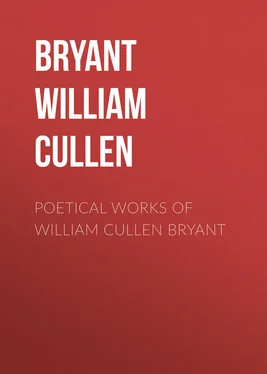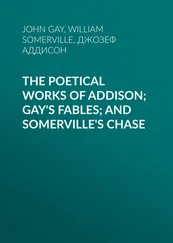William Bryant - Poetical Works of William Cullen Bryant
Здесь есть возможность читать онлайн «William Bryant - Poetical Works of William Cullen Bryant» — ознакомительный отрывок электронной книги совершенно бесплатно, а после прочтения отрывка купить полную версию. В некоторых случаях можно слушать аудио, скачать через торрент в формате fb2 и присутствует краткое содержание. ISBN: , Жанр: foreign_antique, foreign_prose, foreign_poetry, на английском языке. Описание произведения, (предисловие) а так же отзывы посетителей доступны на портале библиотеки ЛибКат.
- Название:Poetical Works of William Cullen Bryant
- Автор:
- Жанр:
- Год:неизвестен
- ISBN:http://www.gutenberg.org/ebooks/29700
- Рейтинг книги:3 / 5. Голосов: 1
-
Избранное:Добавить в избранное
- Отзывы:
-
Ваша оценка:
- 60
- 1
- 2
- 3
- 4
- 5
Poetical Works of William Cullen Bryant: краткое содержание, описание и аннотация
Предлагаем к чтению аннотацию, описание, краткое содержание или предисловие (зависит от того, что написал сам автор книги «Poetical Works of William Cullen Bryant»). Если вы не нашли необходимую информацию о книге — напишите в комментариях, мы постараемся отыскать её.
Poetical Works of William Cullen Bryant — читать онлайн ознакомительный отрывок
Ниже представлен текст книги, разбитый по страницам. Система сохранения места последней прочитанной страницы, позволяет с удобством читать онлайн бесплатно книгу «Poetical Works of William Cullen Bryant», без необходимости каждый раз заново искать на чём Вы остановились. Поставьте закладку, и сможете в любой момент перейти на страницу, на которой закончили чтение.
Интервал:
Закладка:
Now thou art not – and yet the men whose guilt
Has wearied Heaven for vengeance – he who bears
False witness – he who takes the orphan's bread,
And robs the widow – he who spreads abroad
Polluted hands in mockery of prayer,
Are left to cumber earth. Shuddering I look
On what is written, yet I blot not out
The desultory numbers; let them stand,
The record of an idle revery.
THE MASSACRE AT SCIO. 3 3 This poem, written about the time of the horrible butchery of the Sciotes by the Turks, in 1824, has been more fortunate than most poetical predictions. The independence of the Greek nation which it foretold, has come to pass, and the massacre, by inspiring a deeper detestation of their oppressors, did much to promote that event.
Weep not for Scio's children slain;
Their blood, by Turkish falchions shed,
Sends not its cry to Heaven in vain
For vengeance on the murderer's head.
Though high the warm red torrent ran
Between the flames that lit the sky,
Yet, for each drop, an armèd man
Shall rise, to free the land, or die.
And for each corpse, that in the sea
Was thrown, to feast the scaly herds,
A hundred of the foe shall be
A banquet for the mountain-birds.
Stern rites and sad shall Greece ordain
To keep that day along her shore,
Till the last link of slavery's chain
Is shattered, to be worn no more.
THE INDIAN GIRL'S LAMENT
An Indian girl was sitting where
Her lover, slain in battle, slept;
Her maiden veil, her own black hair, 4 4 "The unmarried females have a modest falling down of the hair over the eyes." – Eliot.
Came down o'er eyes that wept;
And wildly, in her woodland tongue,
This sad and simple lay she sung:
"I've pulled away the shrubs that grew
Too close above thy sleeping head,
And broke the forest-boughs that threw
Their shadows o'er thy bed,
That, shining from the sweet southwest,
The sunbeams might rejoice thy rest.
"It was a weary, weary road
That led thee to the pleasant coast,
Where thou, in his serene abode,
Hast met thy father's ghost;
Where everlasting autumn lies
On yellow woods and sunny skies.
"'Twas I the broidered mocsen made,
That shod thee for that distant land;
'Twas I thy bow and arrows laid
Beside thy still cold hand;
Thy bow in many a battle bent,
Thy arrows never vainly sent.
"With wampum-belts I crossed thy breast,
And wrapped thee in the bison's hide,
And laid the food that pleased thee best,
In plenty, by thy side,
And decked thee bravely, as became
A warrior of illustrious name.
"Thou'rt happy now, for thou hast passed
The long dark journey of the grave,
And in the land of light, at last,
Hast joined the good and brave;
Amid the flushed and balmy air,
The bravest and the loveliest there.
"Yet, oft to thine own Indian maid
Even there thy thoughts will earthward stray —
To her who sits where thou wert laid,
And weeps the hours away,
Yet almost can her grief forget,
To think that thou dost love her yet.
"And thou, by one of those still lakes
That in a shining cluster lie,
On which the south wind scarcely breaks
The image of the sky,
A bower for thee and me hast made
Beneath the many-colored shade.
"And thou dost wait and watch to meet
My spirit sent to join the blessed,
And, wondering what detains my feet
From that bright land of rest,
Dost seem, in every sound, to hear
The rustling of my footsteps near."
ODE FOR AN AGRICULTURAL CELEBRATION
Far back in the ages,
The plough with wreaths was crowned;
The hands of kings and sages
Entwined the chaplet round;
Till men of spoil disdained the toil
By which the world was nourished,
And dews of blood enriched the soil
Where green their laurels flourished.
– Now the world her fault repairs —
The guilt that stains her story;
And weeps her crimes amid the cares
That formed her earliest glory.
The proud throne shall crumble,
The diadem shall wane,
The tribes of earth shall humble
The pride of those who reign;
And War shall lay his pomp away; —
The fame that heroes cherish,
The glory earned in deadly fray
Shall fade, decay, and perish.
Honor waits, o'er all the earth,
Through endless generations,
The art that calls her harvest forth,
And feeds th' expectant nations.
RIZPAH
And he delivered them into the hands of the Gibeonites, and they hanged them in the hill before the Lord; and they fell all seven together, and were put to death in the days of the harvest, in the first days, in the beginning of barley-harvest.
And Rizpah, the daughter of Aiah, took sackcloth, and spread it for her upon the rock, from the beginning of harvest until the water dropped upon them out of heaven, and suffered neither the birds of the air to rest upon them by day, nor the beasts of the field by night.
2 Samuel, xxi. 10.Hear what the desolate Rizpah said,
As on Gibeah's rocks she watched the dead.
The sons of Michal before her lay,
And her own fair children, dearer than they:
By a death of shame they all had died,
And were stretched on the bare rock, side by side.
And Rizpah, once the loveliest of all
That bloomed and smiled in the court of Saul,
All wasted with watching and famine now,
And scorched by the sun her haggard brow,
Sat mournfully guarding their corpses there,
And murmured a strange and solemn air;
The low, heart-broken, and wailing strain
Of a mother that mourns her children slain:
"I have made the crags my home, and spread
On their desert backs my sackcloth bed;
I have eaten the bitter herb of the rocks,
And drunk the midnight dew in my locks;
I have wept till I could not weep, and the pain
Of the burning eyeballs went to my brain.
Seven blackened corpses before me lie,
In the blaze of the sun and the winds of the sky.
I have watched them through the burning day,
And driven the vulture and raven away;
And the cormorant wheeled in circles round,
Yet feared to alight on the guarded ground.
And when the shadows of twilight came,
I have seen the hyena's eyes of flame,
And heard at my side his stealthy tread,
But aye at my shout the savage fled:
And I threw the lighted brand to fright
The jackal and wolf that yelled in the night.
"Ye were foully murdered, my hapless sons,
By the hands of wicked and cruel ones;
Ye fell, in your fresh and blooming prime,
All innocent, for your father's crime.
He sinned – but he paid the price of his guilt
When his blood by a nameless hand was spilt;
When he strove with the heathen host in vain,
And fell with the flower of his people slain,
And the sceptre his children's hands should sway
From his injured lineage passed away.
"But I hoped that the cottage-roof would be
A safe retreat for my sons and me;
And that while they ripened to manhood fast,
They should wean my thoughts from the woes of the past;
And my bosom swelled with a mother's pride,
As they stood in their beauty and strength by my side,
Tall like their sire, with the princely grace
Of his stately form, and the bloom of his face.
Интервал:
Закладка:
Похожие книги на «Poetical Works of William Cullen Bryant»
Представляем Вашему вниманию похожие книги на «Poetical Works of William Cullen Bryant» списком для выбора. Мы отобрали схожую по названию и смыслу литературу в надежде предоставить читателям больше вариантов отыскать новые, интересные, ещё непрочитанные произведения.
Обсуждение, отзывы о книге «Poetical Works of William Cullen Bryant» и просто собственные мнения читателей. Оставьте ваши комментарии, напишите, что Вы думаете о произведении, его смысле или главных героях. Укажите что конкретно понравилось, а что нет, и почему Вы так считаете.












